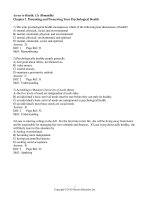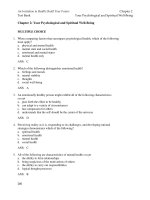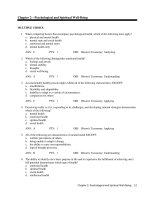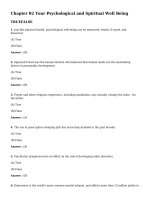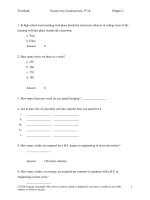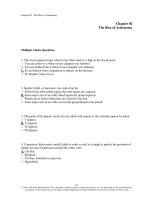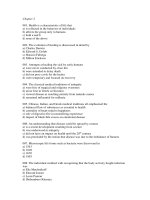An invitation to health 15th edition dianne hales test bank
Bạn đang xem bản rút gọn của tài liệu. Xem và tải ngay bản đầy đủ của tài liệu tại đây (345.78 KB, 12 trang )
An Invitation to Health: Build Your Future
Test Bank
Chapter 2
Your Psychological and Spiritual Well-Being
Chapter 2: Your Psychological and Spiritual Well-Being
MULTIPLE CHOICE
1. When comparing factors that encompass psychological health, which of the following
most apply?
a. physical and mental health
b. mental state and social health
c. emotional and mental states
d. mental health only
ANS: C
2. Which of the following distinguishes emotional health?
a. feelings and moods
b. mental stability
c. thoughts
d. social well-being
ANS: A
3. An emotionally healthy person might exhibit all of the following characteristics
except
a. puts forth the effort to be healthy
b. can adapt to a variety of circumstances
c. has compassion for others
d. understands that the self should be the center of the universe
ANS: D
4. Perceiving reality as it is, responding to its challenges, and developing rational
strategies demonstrates which of the following?
a. spiritual health
b. emotional health
c. mental health
d. social health
ANS: C
5. All of the following are characteristics of mental health except
a. the ability to form relationships
b. being suspicious of the motivations of others
c. the ability to carry out responsibilities
d. logical thought processes
ANS: B
280
An Invitation to Health: Build Your Future
Chapter 2
Test Bank
Your Psychological and Spiritual Well-Being
6. How does one's culture help define psychological health?
a. by modeling the way men and women express feelings, either passively or
intensely
b. by having a shared set of attitudes, values, and goals
c. by reinforcing values and beliefs, and creating a sense of belonging and purpose
d. all of the choices
ANS: D
7. Positive emotions when studying positive psychology refers to
a. wisdom and courage
b. strong families
c. hope and trust
d. humor and strengths
ANS: C
8. When studying positive psychology, positive institutions refer to
a. wisdom and courage
b. strong families and democracy
c. hope and trust
d. humor and strengths
ANS: B
9. Which is not a component of self-compassion?
a. facing painful thoughts without avoiding them
b. engaging in negative self-talk
c. treating oneself kindly in the face of perceived inadequacy
d. recognizing discomfort as an unavoidable part of the human experience
ANS: B
10. Emotional quotient is the ability to
a. understand yourself
b. use emotions to guide your thinking and actions
c. track how many times you get emotional or upset
d. have feelings and moods
ANS: B
11. College students who rank high in extraversion are more likely to
a. binge drink
b. wear seat beats
c. eat fruits and vegetables
d. keep a journal
ANS: A
281
An Invitation to Health: Build Your Future
Test Bank
Chapter 2
Your Psychological and Spiritual Well-Being
12. When comparing the following choices, which one would translate into the most
basic needs according to Maslow?
a. self-respect
b. food and shelter
c. protection from harm
d. receiving affection
ANS: B
13. According to Maslow, to attain the highest level of psychological health one must
first satisfy which of the following?
a. physiological needs
b. safety and security
c. love and affection
d. all of the choices
ANS: D
14. According to Maslow's hierarchy of needs, which of the following would be achieved
by individuals who function at the highest possible level?
a. marital bliss
b. terminal happiness
c. self-actualization
d. basic fulfillment
ANS: C
15. All of the following are true of self-esteem, except
a. Self-esteem is belief or pride in oneself.
b. Self-esteem develops over time.
c. You are not born with self-esteem.
d. Self-esteem is based on external factors.
ANS: D
16. One of the best-reported predictors of college adjustment is
a. good grades in high school
b. strong spiritual and moral values
c. high self-esteem
d. positive, happy outlook on life
ANS: C
17. Research on happiness factors point out that true happiness is based on
a. spending money on things that are pleasurable
b. spending money on bigger material things
c. having more education in your life
282
An Invitation to Health: Build Your Future
Chapter 2
Test Bank
Your Psychological and Spiritual Well-Being
d. surrounding yourself with happy people
ANS: A
18. Happiness
a. reduces the risk of dying in healthy people
b. reduces the risk of dying in those with diagnosed diseases
c. both a and b
d. has no impact on one’s risk of dying
ANS: C
19. Which of the following describes an inclination to expect the best possible outcome?
a. happiness
b. assertiveness
c. optimism
d. altruism
ANS: C
20. An example of optimism would be
a. having expectations for a positive outcome
b. perceiving negative experiences as the norm, not the exception
c. blaming oneself when things go wrong
d. being satisfied with oneself
ANS: A
21. Which of the following describes a sustained emotional state that colors one's view of
the world for hours or days?
a. a feeling
b. an idea
c. a mood
d. a thought
ANS: C
22. The technique of “reframing” your attitude refers to:
a. using humor in a negative situation
b. being independent in determining your attitude
c. developing an external locus of control
d. looking at a negative experience in a more positive light
ANS: D
23. An effective way to manage a bad mood is to
a. Ruminate on why you are feeling bad.
b. Change what caused the bad mood.
283
An Invitation to Health: Build Your Future
Test Bank
Chapter 2
Your Psychological and Spiritual Well-Being
c. Use alcohol or drugs to numb the feeling and make it go away.
d. Distract yourself by keeping busy.
ANS: B
24. To banish bad feelings, one of the most effective strategies is to
a. get aerobic exercise
b. alter your negative feelings
c. laugh
d. reframe your thinking process
ANS: A
25. Laughing is a way to do all of the following except
a. Stimulate the heart.
b. Increase rage.
c. Overcome doubt.
d. Strengthen the immune system.
ANS: B
26. Individuals who are true to themselves and develop independence demonstrate which
of the following characteristics?
a. optimism
b. autonomy
c. assertiveness
d. extroversion
ANS: B
27. An autonomous individual has a locus of control that is
a. negative
b. internal
c. individualized
d. external
ANS: B
28. The ability to identify your basic purpose in life and experience the fulfillment of
achieving your full potential demonstrates which type of health?
a. emotional health
b. spiritual health
c. social health
d. intellectual health
ANS: B
29. Spirituality is
284
An Invitation to Health: Build Your Future
Chapter 2
Test Bank
Your Psychological and Spiritual Well-Being
a.
b.
c.
d.
the same as religiosity
identifying a basic purpose in life and experiencing your full potential
giving to your church on a regular basis
praying at least once a day
ANS: B
30. Which of the following translates into a capacity to sense, understand, and tap into the
highest parts of ourselves, others, and the world around us?
a. emotional intelligence
b. spiritual intelligence
c. intelligence quotient
d. emotional quotient
ANS: B
31. A key difference between “spirituality” and “spiritual intelligence” is that
a. Old-fashioned morality is key in spiritual intelligence.
b. Spiritual intelligence does not focus on a God above.
c. Spirituality is more based on “happiness and peace.”
d. Spiritual intelligence is more value-oriented than spirituality.
ANS: B
32. To evaluate things, people, events, and oneself, a person would utilize which of the
following criteria?
a. values
b. beliefs
c. religion
d. expectations
ANS: A
33. One of the most effective “gratitude interventions” is
a. composing an apology letter
b. exercising
c. giving gifts to people
d. keeping a diary of things you are grateful for
ANS: D
34. Forgiving someone is a
a. sign of weakness
b. simple process
c. one-time thing
d. way to reclaim one’s power to choose
ANS: D
285
An Invitation to Health: Build Your Future
Test Bank
Chapter 2
Your Psychological and Spiritual Well-Being
35. Inadequate sleep has been linked to all of the following except
a. weight loss
b. depression
c. diabetes
d. smoking
ANS: A
36. The most common complaint of college students is
a. general morning tiredness
b. insomnia
c. restless leg syndrome
d. sleep apnea
ANS: A
37. Which is more likely to occur with sleep deprivation?
a. enhanced memory recall
b. weight gain through altered metabolism
c. less stress
d. more production of influenza-fighting antibodies
ANS: B
38. Recent research shows that “power naps”
a. will cause weight gain
b. lower stress
c. provide no benefits
d. are only beneficial on weekends
ANS: B
39. Slow-wave sleep occurs during
a. NREM stage 1
b. NREM stage 2
c. NREM stages 3 and 4
d. REM sleep
ANS: C
40. The vivid-dreams stage of sleep occurs at which point?
a. non-REM stage 1 twilight zone
b. stage 3 delta slow-wave sleep
c. REM sleep
d. dozing-off stage during a power nap
ANS: C
286
An Invitation to Health: Build Your Future
Chapter 2
Test Bank
Your Psychological and Spiritual Well-Being
41. During REM sleep
a. The large muscles of the arms and legs are paralyzed.
b. Blood flow through the brain slows down.
c. The eyes are not responsive to light.
d. “Delta” sleep occurs.
ANS: A
42. All of the following may be effective for people with insomnia except
a. phototherapy
b. cognitive therapy
c. sleep restriction therapy
d. relaxation therapy
ANS: A
43. A CPAP machine might be useful for someone suffering from
a. sleep apnea
b. a circadian rhythm disorder
c. restless leg syndrome
d. insomnia
ANS: A
44. A common sleep disorder that usually occurs among people who work odd shifts or
switch from a day to night shift is
a. circadian rhythm disorder
b. sleep apnea
c. restless leg syndrome
d. insomnia
ANS: A
45. The optimal dose of melatonin
a. has been established by the FDA
b. is smaller for synthetic versions
c. differs based on age
d. is not known
ANS: D
COMPLETION
1. Your ____________________ can be identified by your feelings and mood.
ANS: emotional health
287
An Invitation to Health: Build Your Future
Test Bank
Chapter 2
Your Psychological and Spiritual Well-Being
2. ____________________ is the ability to monitor and use emotions to guide thinking
and actions.
ANS: Emotional intelligence
3. The top level of one's psychological health, once all other levels of well-being have
been met, is known as ____________________.
ANS: self-actualization
4. Positive thinking and talking is one of the most useful techniques for boosting
____________________.
ANS: self-esteem
5. About 50 percent of your happiness quotient is based on _______________.
ANS: genetics
6. When one is expecting a very good possible outcome to a situation, the person is said
to possess ____________________.
ANS: optimism
7. Thinking about a situation in a different way and putting a positive spin on it utilizes
the technique of __________ __________, or "____________________."
ANS: cognitive reappraisal; reframing
8. ____________ is one of the healthiest ways of coping with life’s ups and downs.
ANS: Humor
9. When a person is said to be ____________________, he or she has independence and
control of their life.
ANS: autonomous
10. A person's ____________________ guides them to an inner peace, and their values
and ethics.
ANS: spirituality
11. The capacity to sense, understand, and tap into the highest parts of ourselves is known
as ____________________.
288
An Invitation to Health: Build Your Future
Chapter 2
Test Bank
Your Psychological and Spiritual Well-Being
ANS: spiritual intelligence
12. The quality and quantity of life can be affected by the belief in a higher power
through the application of ____________________ prayer.
ANS: petitionary
13. The word forgive comes from the Greek word for ____________________.
ANS: letting go
14. There are _______ stages of NREM sleep.
ANS: four
15. Another name for REM sleep is ____________________ sleep.
ANS: dream
16. ____________________ is a lack of sleep so severe that it interferes with functioning
during the day.
ANS: Insomnia
17. ____________________ is the absence of breathing for a brief period.
ANS: Sleep apnea
18. ____________________ disorders are problems involving the time of sleep.
ANS: Circadian rhythm
19. After aspirin, ____________________ are the most widely used drugs in the United
States.
ANS: sleeping pills
20. A common dietary supplement sometimes used as a sleeping aid is
____________________.
ANS: melatonin
289
An Invitation to Health: Build Your Future
Test Bank
Chapter 2
Your Psychological and Spiritual Well-Being
MATCHING
Match the items:
a. values
b. gratitude
c. mood
d. self-actualization
e. spiritual intelligence
f.
g.
h.
i.
j.
emotional health
cognitive reappraisal
autonomy
optimism
self-esteem
1.
2.
3.
4.
5.
6.
7.
8.
9.
10.
Fullest potential
Best predictor of college adjustment
Feelings and moods
Anticipating positive outcomes
Reframing
Criteria by which you evaluate others, and yourself
Capacity to tap into the world around us
Appreciation for everything that makes life a little better
Independence
Sustained emotional state
1.
2.
3.
4.
5.
6.
7.
8.
9.
10.
ANS:
ANS:
ANS:
ANS:
ANS:
ANS:
ANS:
ANS:
ANS:
ANS:
D
J
F
I
G
A
E
B
H
C
ESSAY
1. Compare and contrast the characteristics that a psychologically healthy person might
exhibit with those that a psychologically unhealthy person might exhibit.
ANS:
Emotional health determination to be healthy and have flexibility and
adaptability, sense of meaning in life, compassion, control over mind and body
Mental health responsible, ability to form relationships, rational, logical
thought processes, realistic perceptions, ability to adapt
2. Discuss the factors that account for a person’s happiness quotient.
290
An Invitation to Health: Build Your Future
Chapter 2
Test Bank
Your Psychological and Spiritual Well-Being
ANS:
Fifty percent is genetic.
Ten percent is due to life circumstances.
Forty percent depends on what a person does to make him or herself happy.
3. Explain the difference between possessing internal versus external locus of control.
Provide an example of each.
ANS:
Internal locus of control is from within yourself.
External locus of control is relying on others for control.
4. Discuss how having a spiritual life can enhance one's overall health and wellness.
ANS:
Increases calmness and inner strength
Enhances sense of well being
Lowers risk of death
5. Explain the differences between the four stages of REM sleep.
ANS:
Stage 1 twilight zone between full wakefulness and sleep
Stage 2 brain waves are larger and punctuated with sudden bursts of
electrical activity
Stages 3 and 4 the most profound state of unconsciousness
291
